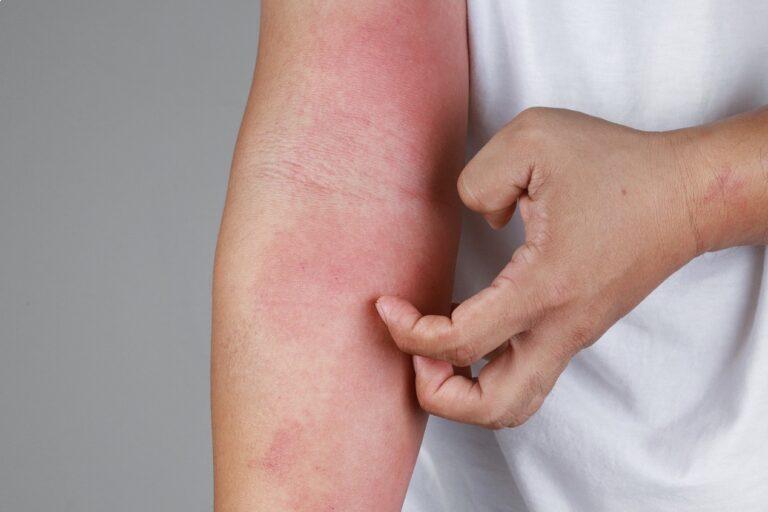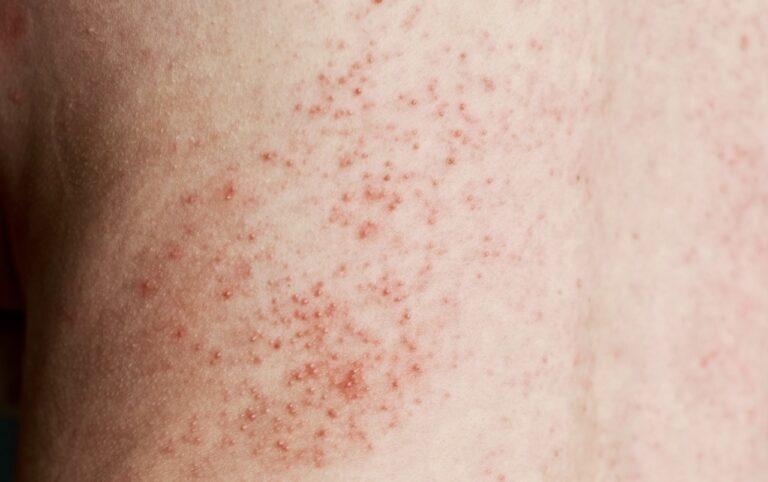Eczema
Get valuable insights into Eczema, including its causes, symptoms, prevention strategies, and treatment options, while also learning about how you can lower the cost of the medications used to treat Eczema.

MEDICAL INFORMATION
Eczema Key Facts
Related Medications
Eczema, also known as atopic dermatitis, is a common chronic skin condition that affects millions of people worldwide. Here, we aim to provide you with a comprehensive overview of eczema, including its definition, symptoms, causes, and management strategies. By understanding the complexities of eczema, individuals and healthcare professionals can better navigate this condition, promote effective treatment, and improve the quality of life for those affected by it.
What is the definition of eczema?
Atopic eczema is a chronic inflammatory skin condition characterized by dry, inflamed, and itchy skin. It is a common condition that can affect individuals of all ages, but it is most commonly seen in infants and young children. Eczema is often characterized by red, scaly patches on the skin, which can become swollen, blistered, or crusted. The exact cause of eczema is not fully understood, but it is believed to involve a combination of genetic, immune system, and environmental factors. Eczema can be triggered by various factors, including irritants, allergens (such as food allergies), dry skin, stress, and temperature changes. The condition can be chronic, with periods of flare-ups and remission. Although eczema cannot be cured, effective management and treatment can help control symptoms and improve the quality of life for individuals affected by the condition.
What are the different types of eczema?
There are several different types of eczema, each with distinct characteristics and triggers. Here are the main types of eczema:
Atopic dermatitis
Atopic dermatitis is the most common form of eczema, often starting in childhood and persisting into adulthood. It is characterized by dry, itchy, and inflamed skin, along with a personal or family history of allergic conditions like asthma or hay fever. Atopic dermatitis commonly affects the face, hands, feet, and creases of the elbows and knees.
Contact dermatitis
- Contact dermatitis occurs when the skin comes into direct contact with irritants or allergens, leading to an inflammatory reaction. There are two subtypes:
- Allergic contact dermatitis: It develops when the immune system reacts to specific substances, such as certain metals, fragrances, or chemicals
- Irritant contact dermatitis: It results from exposure to irritants like soaps, detergents, solvents, or prolonged moisture
Nummular eczema
Nummular eczema presents as round or coin-shaped patches of irritated skin that may be itchy, dry, and scaly. This type of eczema is more common in adults and is often triggered by dry skin, cold weather, or environmental factors.
Dyshidrotic eczema
Dyshidrotic eczema is characterized by small, itchy blisters that primarily affect the hands and feet. The blisters may be accompanied by redness, swelling, and cracking of the skin. Stress, allergies, and exposure to irritants are known triggers for this type of eczema.
5. Seborrheic dermatitis
Seborrheic dermatitis typically affects areas of the body rich in oil glands, such as the scalp, face (particularly around the nose and eyebrows), and upper chest. It is characterized by red, scaly patches, and may be associated with dandruff. Seborrheic dermatitis can flare up and subside periodically.
It’s important to note that some individuals may experience a combination of different types of eczema or have overlapping symptoms. Proper diagnosis by a healthcare professional is essential to determine the specific type of eczema and guide appropriate treatment approaches.
What are the causes and triggers of eczema?
The exact causes of eczema are not fully understood, but it is believed to involve a combination of genetic, immune system, and environmental factors. Here are the main causes and triggers associated with eczema
Genetic factors
Family history: Eczema tends to run in families, indicating a genetic predisposition. Certain variations in genes related to skin barrier function and immune responses may increase the risk of developing eczema.
Immune system dysfunction
- Abnormal immune response: People with eczema often have an overactive immune response to irritants or allergens, leading to inflammation and skin damage
- Defective skin barrier: Eczema is associated with a compromised skin barrier, which allows moisture loss and makes the skin more susceptible to irritants, allergens, and microbial invasion
Environmental factors
- Allergens: Substances such as pollen, pet dander, dust mites, mold, and certain foods can trigger allergic reactions in susceptible individuals, leading to eczema flare-ups
- Irritants: Contact with harsh soaps, detergents, cleaning products, chemicals, or certain fabrics can irritate the skin and trigger eczema symptoms
- Dry skin: Individuals with dry skin have a weakened skin barrier, making them more prone to eczema. Low humidity, cold weather, and excessive bathing or scrubbing can exacerbate dryness
Psychological and Emotional Factors
- Stress: Emotional stress and high levels of stress hormones can worsen eczema symptoms or trigger flare-ups
- Anxiety and Mental Health: Some individuals with eczema may experience anxiety, depression, or other mental health conditions that can influence symptom severity
Hormonal Factors
Hormonal Changes: Hormonal fluctuations, such as during pregnancy or menstrual cycles, can impact eczema symptoms in some individuals
It’s important to note that triggers can vary from person to person, and not everyone with eczema will have the same triggers. Identifying and avoiding triggers, when possible, can help reduce the frequency and severity of eczema flare-ups. However, managing eczema often requires a multifaceted approach involving proper skincare, moisturization, avoiding irritants, allergen control, stress management, and medical treatment. Consulting with a healthcare professional, such as a dermatologist, can provide personalized guidance for managing eczema triggers effectively.
What are the symptoms of eczema?
The symptoms of eczema can vary in severity and presentation, but they typically involve the skin. Here are the main symptoms associated with eczema:
Itching (Pruritus)
Itching is one of the primary symptoms of eczema and can range from mild to intense. Itching can be persistent and may worsen at night, leading to scratching, which can further irritate the skin and cause damage
Redness and Inflammation
Eczema patches often appear as red or reddish-brown areas of the skin. The affected skin may become inflamed, swollen, or warm to the touch
Dryness and Scaling
Eczema-prone skin tends to be dry and may appear rough, scaly, or flaky. Dry patches can contribute to itching and discomfort
Thickened Skin
In chronic cases or with frequent scratching, the affected skin may become thickened, leathery, or lichenified. This thickening occurs as a response to long-term inflammation and repeated scratching
Blisters and oozing
In more severe cases or during flare-ups, eczema may present with blisters that can ooze fluid or form crusts. This symptom is more commonly seen in certain types of eczema, such as dyshidrotic eczema
Skin discoloration
Prolonged or chronic eczema can lead to changes in skin pigmentation, resulting in areas of darker or lighter skin
Sensitive skin
Eczema-prone skin tends to be more sensitive and reactive, making it susceptible to irritation from various triggers, such as certain fabrics, soaps, or skincare products
The location and extent of eczema symptoms can vary depending on the individual and the specific type of eczema. Common areas affected by eczema include the face, hands, elbows, knees, neck, and areas where the skin folds, such as behind the knees or in the creases of the elbows.
What are the management and treatment options for eczema?
The management and treatment of eczema has the aim to control symptoms, reduce inflammation, relieve itching, and improve the overall quality of life for individuals affected by the condition. Here are the main approaches for managing and treating eczema:
Skincare and moisturization
- Regularly moisturize the skin: Apply moisturizers or emollients multiple times a day to keep the skin hydrated and prevent dryness. Opt for fragrance-free, hypoallergenic products
- Gentle cleansing: Use mild, fragrance-free cleansers and avoid hot water, as it can further dry out the skin. Pat the skin dry gently after bathing
- Avoid irritants: Identify and avoid potential irritants such as harsh soaps, detergents, fragrances, and certain fabrics that can trigger eczema flare-ups
Topical medications
- Topical Corticosteroids: These anti-inflammatory steroid medications are commonly prescribed for eczema flare-ups. They help reduce itching, inflammation, and redness. Different strengths are available based on the severity of symptoms and affected areas
- Topical calcineurin Inhibitors: Non-steroidal creams or ointments, such as tacrolimus or pimecrolimus, can be prescribed for eczema in sensitive areas, such as the face or groin. They also help reduce inflammation and itching
Wet dressings and bandages
Applying wet dressings or bandages to affected areas can help soothe the skin, reduce inflammation, and promote healing. They can be particularly beneficial during acute flare-ups
Antihistamines
Oral antihistamines, both sedating and non-sedating, can be used to alleviate itching and help improve sleep during eczema flare-ups
Avoiding triggers
Identify and avoid triggers that may worsen eczema symptoms. These can include certain foods, environmental allergens, stress, or exposure to irritants
Phototherapy
Controlled exposure to ultraviolet (UV) light, either natural sunlight or artificial light therapy, under medical supervision can help improve eczema symptoms in some individuals
Psychological support
Psychological support and stress management techniques can be beneficial for individuals with eczema, as stress and emotional factors can influence symptom severity
Medications
In some cases, oral medications such as immunosuppressants or systemic corticosteroids may be prescribed for severe or widespread eczema that does not respond to other treatments. These medications require careful monitoring and should be used under medical supervision.
It’s important to note that treatment plans should be personalized and may involve a combination of approaches depending on the severity and specific needs of each individual. Regular follow-ups with a healthcare professional, typically a dermatologist, can help monitor progress, adjust treatment as needed, and provide ongoing support for managing eczema effectively.
What are the complications of eczema?
While eczema itself is a chronic inflammatory skin condition, it can lead to several complications and associated health issues. Here are some of the potential complications of eczema:
Skin infections
Due to the impaired skin barrier and constant scratching, individuals with eczema are more prone to bacterial, viral, or fungal skin infections. Common infections include impetigo, cellulitis, herpes simplex, or fungal infections like candidiasis
Allergic contact dermatitis
Prolonged exposure to irritants or allergens can lead to the development of allergic contact dermatitis, which can cause further inflammation, itching, and skin damage
Eczema herpeticum
Eczema herpeticum is a rare but serious complication where the herpes simplex virus infects areas of broken skin in individuals with eczema. It can cause painful blisters, fever, and systemic symptoms, requiring immediate medical attention
Sleep disturbances and psychosocial impact
Itchiness, discomfort, and the impact on daily life can disrupt sleep patterns, leading to fatigue and reduced quality of life. Eczema can also have a significant psychological impact, causing stress, anxiety, depression, or social withdrawal
Skin discoloration and scarring
Persistent or severe eczema can result in changes in skin pigmentation, leading to areas of darker or lighter skin. Additionally, repeated scratching and inflammation can cause scarring or thickened skin in affected areas
Reduced quality of life
The chronic nature of eczema, along with its impact on physical appearance, daily activities, and social interactions, can have a significant negative impact on an individual’s overall well-being and quality of life
It’s important to seek medical attention if complications arise or if eczema symptoms worsen despite appropriate self-care measures. Early intervention and effective management can help prevent or minimize complications associated with eczema.
What medications are used in the management and treatment of eczema?
Various medications may be prescribed based on the severity of symptoms and individual needs. Here are the main medications commonly used in the management and treatment of eczema
Topical steroids
Topical corticosteroids are the most commonly prescribed medications for eczema. They work by reducing inflammation and suppressing the immune response in the skin. They are available in different strengths and formulations (creams, ointments, lotions) depending on the affected area and severity of symptoms
Topical calcineurin inhibitors
Topical calcineurin inhibitors, such as tacrolimus (Protopic) and pimecrolimus (Elidel), are non-steroidal medications used to reduce inflammation and manage eczema symptoms. They are typically prescribed for sensitive areas like the face, neck, or groin
Topical phosphodiesterase-4 (PDE4) Inhibitors
Crisaborole (Eucrisa) is a topical PDE4 inhibitor that helps to reduce inflammation and relieve eczema symptoms. It is generally prescribed for mild to moderate eczema in both children and adults
Topical immunomodulators
Some immunomodulators, such as topical tacrolimus and pimecrolimus, can help modulate the immune response in the skin and reduce inflammation in eczema
Systemic immunosuppressants
In severe cases of eczema that do not respond to other treatments, systemic immunosuppressants may be prescribed. These immunology medications, such as cyclosporine or methotrexate, work by suppressing the immune system to reduce inflammation. They are typically reserved for short-term use due to potential side effects and require close monitoring
Antihistamines, both sedating and non-sedating, may be recommended to help alleviate itching and promote better sleep during eczema flare-ups. They do not directly treat eczema but can provide temporary relief from symptoms
Biologics
Biologics are a type of medication that can be used to treat severe forms of certain conditions, including eczema. These drugs are not made through traditional chemical synthesis like most medications, but rather through biological processes. Biologics are usually proteins or other molecules derived from living organisms, such as bacteria, yeast, or mammalian cells
As eczema treatments, biologics work by targeting specific parts of the immune system that are overactive. Biologics can help to reduce this excessive immune response and thereby alleviate the symptoms of eczema
Biologic drugs for eczema often target specific cytokines, which are small proteins released by cells that have a specific effect on the interactions and communications between cells. In eczema, cytokines like Interleukin (IL)-4, IL-13, and IL-31 are overproduced, leading to inflammation and itch
Examples of biologic drugs used in the treatment of eczema include:
- Dupilumab (Dupixent): This is the first biologic that was approved by the FDA for the treatment of moderate-to-severe atopic dermatitis in adults and adolescents who are not adequately controlled with topical therapies or who cannot use them. Dupilumab works by blocking the action of two cytokines, IL-4 and IL-13, which are key drivers of the type 2 inflammation that characterizes atopic dermatitis
- Tralokinumab (Adbry): Approved by the FDA in 2021, tralokinumab is a monoclonal antibody that specifically binds to IL-13, neutralizing it and reducing the inflammatory response
- Nemolizumab: While not yet approved by the FDA as of my knowledge cut-off in 2021, Nemolizumab is in clinical trials for treating atopic dermatitis. It targets IL-31, a key cytokine involved in the itching associated with eczema
These biologic medications are typically administered via injection, either subcutaneously (under the skin) or intravenously (into a vein). While they can be very effective for severe cases of eczema, they are typically reserved for cases that have not responded to more conventional treatments due to their high cost and potential side effects. Potential side effects can include reactions at the injection site, cold sores, and eye problems, among others. As with all medications, the benefits and risks must be evaluated on a case-by-case basis.
What support organizations are available in the UK?
Several organizations in the United Kingdom offer support and resources to people with eczema and their families. Here are a few:
- National Eczema Society: The National Eczema Society offers a comprehensive range of resources for people living with eczema, including up-to-date information about the condition, details about treatments, and advice for day-to-day living. They also operate a helpline for personal support
- British Association of Dermatologists (BAD): While not exclusively focused on eczema, the BAD provides a great deal of information and resources about skin conditions including eczema. They offer patient information leaflets on a variety of skin diseases, including eczema
- British Skin Foundation: The British Skin Foundation is a charity that funds research into skin diseases, including eczema. They also provide educational materials about skin conditions on their website
- Allergy UK: As many people with eczema also suffer from allergies, Allergy UK provides resources and support that can be useful. They offer a helpline, fact sheets on various allergic conditions, and a forum for connecting with others who are living with similar conditions
- Eczema Outreach Support: This is a support service for families struggling with the day-to-day challenges of caring for a child with eczema. They offer a range of resources including a helpline, practical advice, and emotional support
What support organizations are available in the US?
There are several organizations in the U.S. that provide resources, support, and advocacy for individuals with eczema and their families. Here are a few examples:
- National Eczema Association (NEA): This is the largest and most widely recognized organization focused on eczema in the United States. The NEA offers a range of resources including educational materials, community programs, and advocacy initiatives
- American Academy of Dermatology (AAD): Although not exclusively focused on eczema, the AAD offers extensive resources and information on the condition, including treatment options and recommendations for managing symptoms
- Eczema Association for Science and Education (EASE): This organization focuses on providing education about eczema and promoting scientific research into the condition
- Global Parents for Eczema Research (GPER): GPER is a parent-led organization focused on promoting research into eczema treatments and supporting families dealing with the condition
- Asthma and Allergy Foundation of America (AAFA): While not exclusively for eczema, the AAFA provides resources and support for all allergic diseases, including eczema which often co-exists with other allergic conditions
Summary
Eczema is a chronic inflammatory skin condition that requires ongoing management and care. By understanding its symptoms, causes, and triggers, individuals can take steps to prevent flare-ups and manage symptoms effectively. Treatment approaches range from topical medications to lifestyle adjustments, all aimed at minimizing inflammation, relieving itching, and promoting healthy skin. With proper management and support, individuals with eczema can experience improved quality of life and symptom control. Seeking guidance from healthcare professionals is crucial for personalized care and treatment plans tailored to each individual’s specific needs.
NowPatient has taken all reasonable steps to ensure that all material is factually accurate, complete, and current. However, the knowledge and experience of a qualified healthcare professional should always be sought after instead of using the information on this page. Before taking any drug, you should always speak to your doctor or another qualified healthcare provider.
The information provided here about medications is subject to change and is not meant to include all uses, precautions, warnings, directions, drug interactions, allergic reactions, or negative effects. The absence of warnings or other information for a particular medication does not imply that the medication or medication combination is appropriate for all patients or for all possible purposes.








